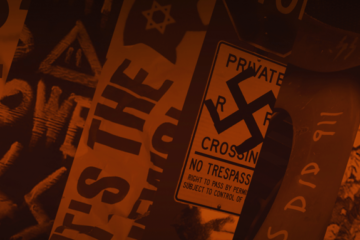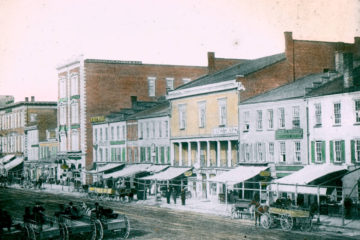A safe, sacred space for men

Learning to rest — and listen — at Temple Beth Or Men’s Retreat
Photos and Story By Marshall Weiss, The Dayton Jewish Observer
One by one, each man has expressed what he hopes to receive over the next 48 hours, and then places a slow-burning candle on a low wooden table in the center of the yoga circle.
Each then places photos of his family on the table — or a small blue stone to represent his family — and tells the men about the people closest to his heart.
Rabbi David Burstein asks the men to close their eyes as he establishes the weekend retreat’s circle of trust, confidentiality, and kindness.
Drawing from the traditional Jewish bedtime prayer, he beckons angels to gather and safeguard the group.
“Mich-ael, Gavriel, Uriel, Raphael.”
He then invokes the Shechinah, the Divine Presence of God, three times.
The circle is now open for the 22 men at Temple Beth Or’s Fifth Annual Men’s Retreat, held at Hope Springs Institute in southeast Ohio’s Hocking Hills.
“I love retreats. I think it’s the best way for me to do my work, to be of service to the men,” said Burstein, who has served as the Reform temple’s assistant rabbi since 2001.
Nine years ago, Burstein started the temple men’s group.
“There was a lot of unification in temple events but there really wasn’t anything that was set aside (for men). We decided from the very beginning that we weren’t going to be a brotherhood — it was just going to be a group of guys getting together and talking,” he said.
“And we would discuss whatever issue would come across. We’ve done everything from legacy to living well, to parenting, to the role of men in Judaism and Reform Judaism, the role of men in a synagogue, what it is to be a man, what it is to be a father, what it is to be a son.”
Burstein said about 40 men participate on the periphery of the men’s group, which meets the first Wednesday of each month. A dozen or so form its active core.
“It’s a way for men to come to services and see someone that they know, because sometimes it doesn’t happen,” he added.
After the men’s group held its first retreat, at Hope Springs five years ago, Burstein said the dozen guys who participated felt a powerful connection and decided to hold one each year.
“For the people who have been here more than once, you look forward to it,” said Mark Gruenberg, who has joined all five retreats.

“Up front, you know it’s going to be relaxing, although emotionally difficult. You really work hard.”
The topic for this year’s retreat was Sabbath. Burstein asked the participants to read Sabbath: Finding Rest, Renewal and Delight in Our Busy Lives written by minister Wayne Muller.
“It’s one of my favorite books,” Burstein said. “I often look for, when I teach, a multi-religion kind of book. Just in general, I think that we have a lot to learn from other cultures and other religions.”
Much of the work the men took up on the retreat explored the importance of rest, and how to remove obstacles that get in the way of true rest.
“Part of what I love about these retreat centers is there’s no cell phone access,” Burstein said. “There’s no wireless access that I’ll let you know about. There’s no alcohol, and the food is excellent, all organic and locally grown. It’s vegetarian, which I love.”
Gruenberg said he hopes to incorporate rest into home life for himself and his family.
“I’m focused on figuring out how to do that,” he said. “I think I’m moving toward setting an example, creating the environment at home.”
The father and husband said he values the introspection that comes with each retreat.
“It’s OK to look at yourself and the way that you feel, in a place that’s safe so you can make changes, to make things better,” he said. “Ultimately, that’s what we all want. Not only for ourselves but for our families and our communities. To me that’s Judaism. It’s helping your family and your community.”
Burstein said he started thinking about approaching the retreat from an interfaith perspective during their second year out.
“I was talking about something Jewish and I looked around and there were a lot of partners of Jews that weren’t Jews,” he recalled. “This isn’t just about Judaism. This is about men. Because we have a lot of the same issues. I’ve done some side work with Christian groups too. It’s just the same stuff.”
Along with members of the temple, some of Burstein’s friends from Cincinnati joined this retreat.
Among the men from the temple, some are active with the men’s group, others aren’t.
“I’ve never really carved the time out for it (the men’s group), but the retreat, Rabbi David and I have been talking about it for a long time,” said congregant Mike Pickard, a first-time participant.
“I don’t know a lot of the guys very well, but I feel I know them better after this weekend.”
A husband and father of two teenagers, Pickard said the message to make time for intentional rest resonated for him.

“We think it’s selfish, but to sit down, slow down and reflect actually makes you operate with more purpose. I like the idea of no one religion (the interfaith retreat format), that it’s open for different interpretations. I was actually raised and baptized Catholic. My family, we’ve raised Sam and Emma as Jewish here. So we’ve kind of figured out a way to make it all work.”
Burstein also presented the men with exercises to understand the importance of active listening; the men practiced actively listening to each other.
“The whole concept is how to be a better man, how to be a better partner, how to be of better service to the community, to the temple, to the community in general and ultimately, how to be of better service to ourselves,” said husband and empty nester Corky Katz, a member of the men’s group since its inception. He’s been to three of the five retreats.
“It was a leap of faith for me, because I was never a retreat kind of guy. I was not sure what was being done at these kind of retreats. I trusted David, I trusted the process, I decided to give it a try and it’s a really enjoyable weekend for me.
“It really begins here and there are people I can talk to at temple about a lot of things that I wouldn’t talk to other people about.”
Burstein said the retreat helps satisfy the need men have for intimacy with other men: the ability to really talk to each other.
“We had a discussion about this on Wednesday night at our group,” he said. “Why is there a need for men’s groups? One of the guys said it so beautifully: that we often have superficial relationships with other men, and we need some depth. Because it can be really lonely being a guy.”
To read the complete May 2014 Dayton Jewish Observer, click here.





